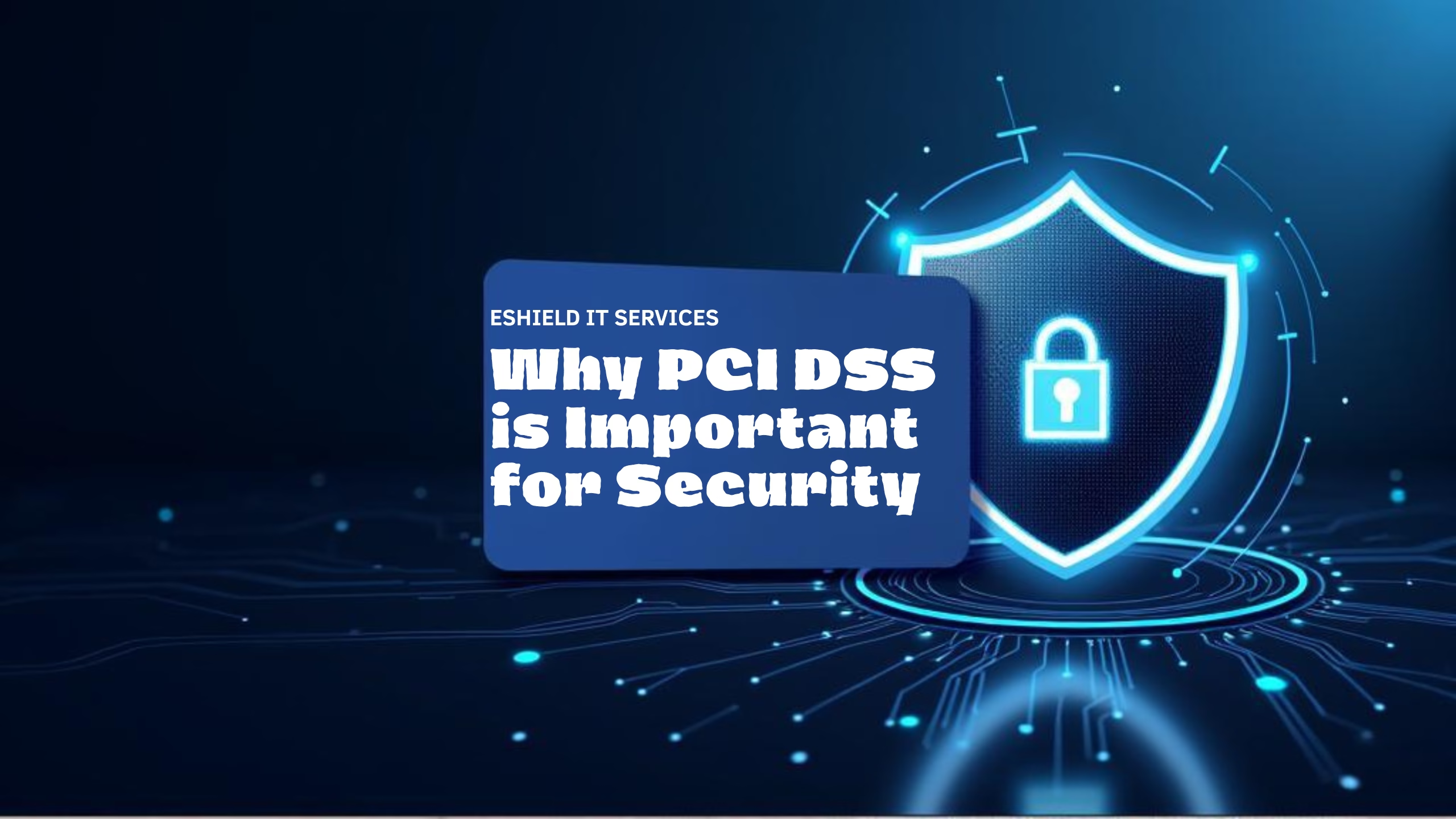Protecting Payment Data and Building Customer Trust
In the United Arab Emirates, keeping payment card transactions safe is key. The Payment Card Industry Data Security Standard (PCI DSS) is vital for this. It helps protect both businesses and customers from data breaches.

Following Payment Card Industry Data Security Standard rules helps keep cardholder data safe. eShieldIT Services says it’s not just a rule. It’s a must to stop data breaches and cyber attacks.
PCI DSS makes payment card transactions safer. This lowers the chance of data breaches and financial losses.
What You Need to Know About Payment Card Security
In the UAE, the digital payment world is changing fast. It’s key for businesses to know about payment card security. E-commerce and digital payments have grown a lot, but they bring new security issues.
The Digital Payment Landscape in the UAE
The UAE is seeing more digital payments. Online banking and mobile payments are becoming more popular. Experts say the UAE’s digital payment market will keep growing, with more transactions.

| Year | Transaction Value (AED Billion) | Growth Rate (%) |
|---|---|---|
| 2022 | 100 | 15 |
| 2023 | 120 | 20 |
Common Security Challenges for Merchants
Merchants in the UAE face many security issues. These include data breaches, cyber-attacks, and not following security rules. eShield IT Services can help by setting up strong security steps.
Some big security problems are:
- Insufficient network security
- Lack of encryption for sensitive data
- Inadequate access controls
Understanding PCI DSS and Its Core Functions
In the UAE, the digital payment world is growing fast. Knowing about PCI DSS is key for merchants. The Payment Card Industry Data Security Standard (PCI DSS) helps keep cardholder data safe. It’s a set of rules for businesses that handle credit card info.
Definition and Scope of PCI DSS
PCI DSS comes from the Payment Card Industry Security Standards Council (PCI SSC). It’s for any company that deals with cardholder data. The rules cover things like encryption, access controls, and security checks.
The Payment Card Industry Security Standards Council
The PCI SSC is a global group that makes and updates PCI DSS. They aim to improve payment card data security worldwide. Their goal is to educate and raise awareness globally.

How PCI DSS Protects Cardholder Data
Payment Card Industry Data Security Standard keeps cardholder data safe in several ways. It uses strong security, scans for vulnerabilities, and controls access. Following these standards helps businesses lower data breach risks and gain customer trust.
In the UAE, working with a reliable service like eShield IT Services can help. They make it easier for businesses to follow PCI DSS. This ensures a safe payment space for their customers.
The 12 Requirements of PCI DSS
Knowing the 12 PCI DSS requirements is key for UAE businesses that handle payment cards. These rules help keep cardholder data safe during processing, storage, and transmission.
Building and Maintaining a Secure Network
The first two rules are about a secure network. Companies must set up firewalls to guard card data. They also can’t use default system passwords or security settings.
Protecting Cardholder Data
Rules three and four focus on keeping cardholder data safe. Businesses must protect stored data and encrypt it when sent over public networks.
Vulnerability Management Program
Rules five and six talk about a strong vulnerability management program. This includes fighting malware and keeping anti-virus software up to date. It also means having secure systems and apps.
Access Control Measures
Rules seven to nine cover access control. Companies must limit who sees card data, check who accesses systems, and control physical access to data.
Regular Monitoring and Testing
Rules ten and eleven highlight the need for constant monitoring and testing. This means watching who accesses data and checking security systems regularly.
Information Security Policy
The last rule is about having a solid information security policy. This policy must cover all staff, be updated often, and be shared with everyone who needs to know.
By following these 12 rules, UAE businesses can stay PCI DSS compliant. This protects their customers’ data and keeps their brand trustworthy.
Implementing PCI DSS in Your UAE Business
For UAE businesses, getting PCI DSS compliant is key to a safe payment space. This means several important steps, like figuring out your merchant level.
Determining Your Merchant Level
The first step is to find out your merchant level. This is based on how many transactions you do each year. Knowing your level is important because it tells you what PCI DSS rules you must follow.
Step-by-Step Implementation Process
The process to follow Payment Card Industry Data Security Standard has several key parts:
- Initial Assessment and Scoping: Find out which systems and processes handle cardholder data.
- Gap Analysis and Remediation: Check your current security against PCI DSS rules and fix any issues.
- Validation and Reporting: Do the needed checks and send reports to your acquirer and the PCI SSC.
Initial Assessment and Scoping
This step is about finding all systems, processes, and people that deal with cardholder data. It’s vital to scope your PCI DSS work right to catch all important areas.
Gap Analysis and Remediation
Do a detailed gap analysis to see where your security doesn’t meet PCI DSS standards. Then, make a plan to fix these gaps.
Validation and Reporting
After fixing issues, check your compliance with the right assessment (like a Self-Assessment Questionnaire or On-Site Assessment). Then, send the needed reports to your acquirer and the Payment Card Industry Data Security Standard.
Compliance Maintenance Strategies
Keeping PCI DSS compliance going is a continuous job. Always check and update your security, do quarterly vulnerability scans, and keep an eye on your network all the time.
Benefits of PCI DSS Compliance
PCI DSS compliance brings many benefits to businesses. It boosts data security and builds customer trust. By following Payment Card Industry Data Security Standard standards, UAE businesses can strengthen their security and lower data breach risks.
Enhanced Data Security and Reduced Breach Risk
PCI DSS compliance greatly improves data security. It requires businesses to take specific security steps. This protects cardholder data and lowers breach risks.
This protection is key to keeping sensitive information safe. It also helps in keeping customer trust high.
Customer Trust and Brand Reputation
Following PCI DSS standards builds customer trust. When customers feel their data is safe, they trust the business more. This boosts the brand’s reputation.
In the competitive UAE market, this trust is very important. It helps businesses stand out.
Avoiding Penalties and Legal Consequences
Not following Payment Card Industry Data Security Standard can lead to big fines and legal issues. But, by being compliant, businesses can avoid these costs. eShield IT Services can help businesses through the compliance process.
Operational Improvements and Efficiency
PCI DSS compliance also makes operations better and more efficient. It introduces secure processes and protocols. This makes operations smoother and reduces data breach risks.
This leads to cost savings and better performance. It’s a win-win for businesses.
| Benefits | Description |
|---|---|
| Enhanced Data Security | Protects cardholder data and reduces breach risk |
| Customer Trust | Builds trust with customers, enhances brand reputation |
| Avoiding Penalties | Reduces the risk of costly fines and legal consequences |
| Operational Efficiency | Streamlines operations, reducing costs and improving performance |
How eShield IT Services Supports PCI DSS Compliance
eShield IT Services helps businesses meet PCI DSS compliance needs. They guide through the complex Payment Card Industry Data Security Standard rules.
Comprehensive Compliance Assessment
eShield IT Services first checks an organization’s PCI DSS compliance. This step finds gaps and areas for betterment.
Customized Implementation Solutions
Then, eShield IT Services gives specific solutions. These help businesses put in place the needed PCI DSS controls and procedures.
Continuous Monitoring and Support
eShield IT Services keeps up the compliance with ongoing monitoring and support. They make sure the business stays up-to-date with PCI DSS standards.
Staff Training and Security Awareness
Teaching staff about their security roles is key to PCI DSS compliance. eShield IT Services offers training and awareness programs. These educate employees on Payment Card Industry Data Security Standard rules and best practices.
| Service | Description |
|---|---|
| Comprehensive Compliance Assessment | Thorough assessment of current PCI DSS compliance status |
| Customized Implementation Solutions | Tailored solutions for implementing PCI DSS controls |
| Continuous Monitoring and Support | Ongoing monitoring and updates for maintaining compliance |
Securing Your Business Through PCI DSS
Keeping your business safe with PCI DSS is key in today’s digital world, even more so in the UAE. More transactions are online, making data protection vital. By following PCI DSS’s 12 rules, you can keep your customers’ data safe and your network secure.
Being PCI DSS compliant does more than just protect data. It also builds trust with your customers and boosts your brand. eShield IT Services helps a lot with this. They offer full support, from checking if you’re compliant to helping you stay that way.
Working with eShield IT Services means you’re on the right path to meeting PCI DSS standards. This lowers the chance of data breaches and fines. Staying ahead in the digital payment world is smart. It makes your transactions safe and reliable.
FAQ
PCI DSS stands for Payment Card Industry Data Security Standard. It’s a set of rules to keep credit card info safe. For UAE businesses that handle credit cards, following PCI DSS is key. It helps prevent data breaches and keeps customers trusting your business.
Your merchant level depends on your annual transaction volume. The PCI Security Standards Council groups merchants into four levels. To find out yours, talk to your payment card brands or acquirer.
PCI DSS has 12 main requirements. They cover network security, protecting cardholder data, and more. This includes setting up firewalls and not using default passwords. Regular network checks are also required.
eShield IT Services offers a range of services to help with PCI DSS. They provide assessments, customized solutions, and ongoing support. Their team can guide you through securing cardholder data.
PCI DSS compliance boosts data security and reduces breach risks. It builds customer trust and protects your brand. It also avoids penalties and can improve your operations.
Assessment frequency varies by merchant level. Higher levels might need more frequent checks. Always check with your Qualified Security Assessor (QSA) for the right schedule for your business.
No, PCI DSS compliance is an ongoing effort. You must keep updating your security to meet changing standards and new threats.
The Payment Card Industry Security Standards Council develops and promotes PCI DSS. They aim to improve payment card data security. They offer resources and guidance for businesses to stay compliant.


